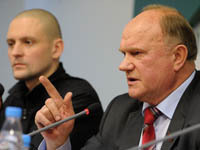Russian communists politically impotent, albeit prone to dictatorship
Presidential candidate Gennady Zyuganov, the leader of the Communist Party of the Russian Federation, released quite exotic ideas about the future of the political development of the country. If Mr. Zyuganov wins the presidential election, he promises to change the Constitution and abolish the position of the prime minister.

Mr. Zyuganov became the last candidate, who presented his vision about the new government and new political reforms in the country. One shall admit that the communist leader is planning curious changes in Russia indeed.
First and foremost, Zyuganov wants to establish the government of people's trust. The new government will consist only of professionals who have remarkable education, extensive work experience and abilities to work in the team. As long as the world is expecting another wave of the economic crisis, as Zyuganov said, one would have to combine the positions of the president and the prime minister for the period of the crisis.
This would of course require adequate changes in the text of the Russian Constitution. To make it happen, the leader of Russian communists offers to set up the constitutional council to develop and introduce the adequate amendments. The council, Zyuganov added, would be chaired by Sergei Baburin and Yury Boldyrev. The political evolution of these two men is like a salad of Yeltsin, Yabloko, Just Russia and finally the CPRF.
As a matter of fact, Zyuganov intends to establish a mild form of dictatorship. He wants to have the "people's" government and hold unlimited powers as the head of state.
Boris Yeltsin did something like that in 1991. When he became the President of the RSFSR (Russian Soviet Federated Socialist Republic), he chaired the government too. Making a speech at the Congress of People's Deputies of the RSFSR, Yeltsin surprised the country and the world. He stated that he would chair the Russian government, or the "cabinet of reforms," as he put it, during this critical time of the country's history.
The eye-opening news generated a joke: "When looking for the prime minister, Yeltsin looked into the mirror and chose himself."
The democratic community was hailing the "courageous" decision of the president. There were also many of those who said that Yeltsin was not competent at all as far as the economic side of the question was concerned. No one listened to them, though. Everyone knows the outcome of the experiment connected with the government of Yegor Gaidar.
Such attempts were taken during the Soviet times as well. The excessive concentration of power in the hands of Joseph Stalin was later interpreted as "personality cult." Nikita Khrushchev also tried to combine high-ranking official positions, for which he was subsequently criticized. It was later decided not to combine the positions of the First Secretary of the Central Committee and the Chairman of the Council of Ministers. However, Brezhnev, Andropov and Chernenko later used the new opportunity to combine the positions of the General Secretary of the Central Committee and the Chairman of the Presidium of the Supreme Council.
Mikhail Gorbachev was not an exception either. He set a record on the number of official positions that were taken in Soviet history. In May 1989, he became the chairman of the Supreme Council of the USSR. It is worthy of note that Boris Yeltsin criticized Gorbachev for doing that and said that the concentration of power in the hands of one person contradicted to democratic principles.
"When there are no clear ideas about the development of economy and the social field, when there's nothing to say about the strengthening of Russia's international position - this is the time when such absurd suggestions appear. Change the Constitution and make president and prime minister become one. All this testifies to Zyuganov's political weakness," Dmitry Vyatkin, a member of United Russia party, deputy chairman of the parliamentary committee for constitutional legislation said.
Scientist of politics Vitaly Ivanov said that "the issues that remain in the competence of the head of state and the head of the government are completely different." "Concentrating those obligations in the hands of one person only can be dangerous for Russia," he said.
Zyuganov's other initiatives raise many questions too. For example, the leader of the Communist Party believes that Sergei Udaltsov, the leader of the Left Front, should be in charge of youth policies. Mr. Udaltsov is known for his activities to organize unauthorized actions of protest.
Moreover, Gennady Zyuganov said that Grigory Yavlinsky, the leader of Yabloko Party, was a "professional economist." However, Zyuganov preferred not to include Yavlinsky in the structure of his "new government" for personal reasons. Zyuganov claimed that Yavlinsky literally compared communists to fascists in his TV ad. "I consider this insulting," Zyuganov said.
Igor Kulagin
Pravda.Ru
Subscribe to Pravda.Ru Telegram channel, Facebook, RSS!


